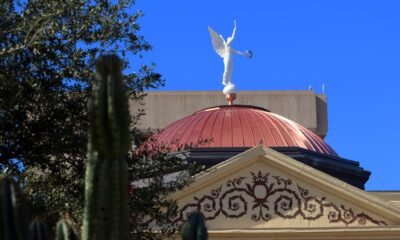andrew gould
Arizona Supreme Court to Safeguard Donor Privacy Rights

By Matthew Holloway |
The Arizona State Supreme Court has agreed to review the case *Center for Arizona Policy v. Hobbs*, focusing on the contentious Proposition 211 and the privacy rights of political donors.
This case, initiated by the Goldwater Institute on behalf of the Center for Arizona Policy and the Arizona Free Enterprise Club, asserts that the Arizona Constitution offers stronger privacy protections than the First Amendment of the U.S. Constitution. The Goldwater Institute underscores that Arizona’s constitution guarantees free speech and privacy, stating, “Every person may freely speak, write, and publish on all subjects,” and that “no person shall be disturbed in his private affairs.”
According to the Goldwater Institute, Proposition 211 undermines these rights by mandating that individuals who contribute to nonprofits disclose their information publicly. The measure, portrayed as enhancing transparency, has faced criticism for failing to inform voters of its true implications.
Attorney Scott Day Freeman from Goldwater called the situation alarming. “People have the right to support causes without fear of retribution or harassment,” he stated, adding that the law compels donors to sacrifice their confidentiality and risks exposing them to potential threats.
A lower court previously dismissed Goldwater’s claims, arguing that the need for an informed electorate supersedes donors’ privacy rights. The court claimed that donors could simply opt out of campaign contributions. Former Arizona Supreme Court Justice Andrew Gould refuted this, explaining that even those who opt out may still have their information disclosed. “Donors can’t control how organizations spend their donations, which means they can’t fully manage their privacy,” he said.
This case emphasizes the Arizona Constitution’s emphasis on protecting donor privacy, a point Gould reiterated: “It affords stronger rights to individuals than the U.S. Constitution. The law violates the promise of confidentiality for donors supporting ballot initiatives, effectively exposing them to undue scrutiny.”
Past incidents highlight the potential dangers of such disclosures. The Goldwater Institute cited cases where political donors have faced threats and violence due to their support for specific initiatives. For instance, donors involved in California’s anti-same-sex marriage initiative in 2008 experienced physical assaults and property damage after their information was made public. A similar situation arose in 2020, when a California agency released documents containing donor information, inciting harassment against those listed.
The U.S. Supreme Court later invalidated the law allowing these disclosures in *Americans for Prosperity Foundation v. Bonta* (2021).
Scot Mussi, President of the Arizona Free Enterprise Club, expressed gratitude for the Supreme Court’s decision to review the case. He emphasized that both the U.S. and Arizona Constitutions uphold the right not just to speak freely, but also to choose not to disclose one’s support for particular causes. Mussi is optimistic that the court will protect Constitutional rights in its ruling on this significant matter.
Matthew Holloway is a senior reporter for AZ Free News. Follow him for updates or share tips via email at Matthew@azfreenews.com.
















